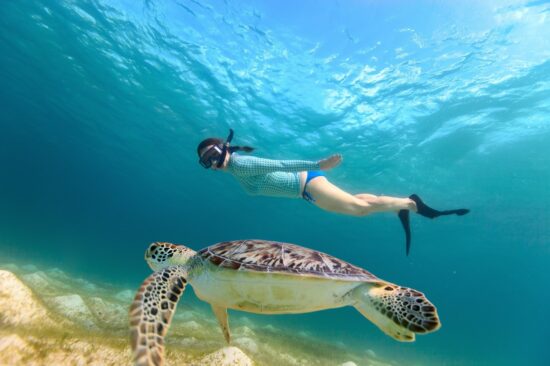Snorkeling offers a mesmerizing window into the underwater world, where vibrant coral reefs, diverse marine life, and crystal-clear waters create an unforgettable experience. However, with the growing popularity of this activity, the environmental impact on fragile marine ecosystems has become a concern. To ensure that future generations can enjoy these underwater wonders, it’s essential to practice eco-friendly snorkeling. Josiah Grauso provides tips and guidelines on how to snorkel responsibly, minimize environmental impact, and protect marine life.
The Importance of Eco-Friendly Snorkeling
Marine ecosystems, particularly coral reefs, are incredibly delicate and can be easily damaged by human activity. Coral reefs, often referred to as the “rainforests of the sea,” provide habitat, food, and protection for a vast array of marine species. However, they are under threat from climate change, pollution, and unsustainable tourism practices. By adopting eco-friendly snorkeling practices, you can help protect these vital ecosystems and contribute to their preservation.
Tips for Eco-Friendly Snorkeling
- Use Reef-Safe Sunscreen
One of the most significant threats to coral reefs is the chemicals found in many traditional sunscreens. Ingredients like oxybenzone and octinoxate can cause coral bleaching, damage DNA, and disrupt the growth and reproduction of marine life. To protect the ocean while protecting your skin, opt for reef-safe sunscreens. These products use mineral-based ingredients like zinc oxide or titanium dioxide, which do not harm marine ecosystems. When applying sunscreen, do so at least 15 minutes before entering the water to allow it to absorb into your skin, reducing the likelihood of it washing off into the ocean.
- Respect Marine Wildlife
While snorkeling, it’s crucial to respect the marine life you encounter. Avoid touching, chasing, or disturbing any animals, as this can cause them stress and potentially harm them. Turtles, fish, and other creatures are accustomed to their natural environment and may react negatively to close human interaction. Additionally, avoid feeding marine life, as this can disrupt their natural feeding habits and lead to dependency on humans.
- Practice Proper Buoyancy
Maintaining proper buoyancy while snorkeling is essential to avoid accidentally touching or damaging coral reefs. Kicking or standing on corals can break them, leading to long-term damage. Practice floating above the reef without letting your fins or body come into contact with it. If you’re not confident in your buoyancy skills, consider taking a snorkeling or diving course to improve your technique.
- Choose Eco-Conscious Tour Operators
When booking a snorkeling tour, choose operators that prioritize environmental responsibility. Eco-conscious tour operators often follow best practices for sustainable tourism, such as limiting the number of snorkelers in a group, educating participants on reef protection, and supporting conservation initiatives. These operators may also use environmentally friendly boats that minimize pollution and avoid dropping anchor on reefs.
- Be Mindful of Your Gear
Your snorkeling gear, including fins, masks, and snorkels, can impact the marine environment. Avoid using fins with sharp edges that could damage corals. When purchasing gear, opt for high-quality, durable equipment that will last, reducing the need for frequent replacements. Additionally, be cautious when adjusting your mask or snorkel underwater to prevent accidental damage to the reef.
- Avoid Collecting Souvenirs
It can be tempting to take a shell or piece of coral as a memento of your snorkeling experience, but doing so can have detrimental effects on the ecosystem. Coral and shells play crucial roles in the marine environment, providing habitats and protection for various species. Removing these items disrupts the balance of the ecosystem. Instead, take photographs and memories home with you, leaving the underwater environment as you found it.
- Dispose of Waste Properly
Littering in the ocean or on the beach can have severe consequences for marine life. Plastics and other waste materials can be ingested by animals, leading to injury or death. Always dispose of your waste properly and consider participating in beach clean-ups to help remove litter from coastal areas. If you bring snacks or drinks with you while snorkeling, ensure that all packaging is securely stored to prevent it from blowing away.
- Support Marine Conservation Efforts
Supporting organizations dedicated to marine conservation is another way to contribute to the protection of marine life. Many non-profits work to restore coral reefs, protect endangered species, and promote sustainable tourism practices. Consider donating to or volunteering with these organizations to help make a positive impact on the ocean.
The Future of Snorkeling and Marine Conservation
As the popularity of snorkeling continues to grow, so does the responsibility of snorkelers to protect the marine environment. By following these eco-friendly practices, you can enjoy the beauty of the ocean while ensuring that it remains vibrant and healthy for generations to come. Remember, every small action counts when it comes to preserving the delicate balance of marine ecosystems.
Snorkeling responsibly not only enhances your experience but also helps safeguard the underwater world you love to explore. By being mindful of your impact, using reef-safe products, respecting marine life, and supporting conservation efforts, you can become a steward of the ocean and contribute to the preservation of its wonders.
